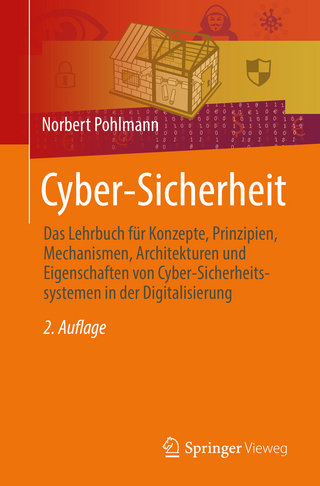
Leveraging Artificial Intelligence (AI) Competencies for Next-Generation Cybersecurity Solutions
Apple Academic Press Inc. (Verlag)
978-1-77491-634-6 (ISBN)
Modern enterprises are facing growing cybersecurity issues due to the massive volume of security-related data they generate over time. AI systems can be developed to resolve a range of these issues with comparative ease. This new book describes the various types of cybersecurity problems faced by businesses and how advanced AI algorithms and models can help eliminate them.
With chapters from industry and security experts, this volume discribes the various types of cybersecurity problems faced by businesses and how advanced AI algorithms and models can help elimintate them. With chapters from industry and security experts, this volume discusses the many new and emerging AI technologies and approaches that can be harnessed to combat cyberattacks, including big data analytics techniques, deep neural networks, cloud computer networks, convolutional neural networks, IoT edge devices, machine learning approaches, deep learning, blockchain technology, convolutional neural networks, and more.
Some unique features of this book include:
Detailed overview of various security analytics techniques and tools
Comprehensive descriptions of the emerging and evolving aspects of artificial intelligence (AI) technologies
Industry case studies for practical comprehension and application
This book, Leveraging the Artificial Intelligence Competencies for Next-Generation Cybersecurity Solutions, illustrates how AI is a futuristic and flexible technology that can be effectively used for tackling the growing menace of cybercriminals. It clearly demystifies the unique contributions of AI algorithms, models, frameworks, and libraries in nullifying the cyberattacks. The volume will be a valuable resource for research students, scholars, academic professors, business executives, security architects, and consultants in the IT industry.
Pethuru Raj, PhD, is Chief Architect and Vice President at Reliance Jio Platforms Ltd., Bangalore, India. Previously, he worked at the IBM Global Cloud Center of Excellence, Wipro Consulting Services, and Robert Bosch Corporate Research. He has more than 20 years of IT industry experience and eight years of research experience. He had a number of international research fellowships as a research scientist at two leading Japanese universities. His main area of focus is emerging technologies such as the Internet of Things, optimization of artificial intelligence models, streaming analytics, blockchain, digital twins, cloud-native computing, edge and serverless computing, reliability engineering, microservices architecture, quantum computing, event-driven architecture, 5G/6G, etc. B. Sundaravadivazhagan, PhD, is a Proferssor in the Department of Information Technology at the University of Technology and Applied Science, Al Mussanah, Oman. His academic and research background spans more than 21 years at a number of institutions. He is working on two financed research projects for the Ministry of Higher Education Research Innovation in Oman. His research interests include Internet of Things, artificial intelligence, machine learning, deep learning, cloud computing, and cybersecurity. He has published more than 30 technical articles in international journals. V. Kavitha, PhD, is an Assistant Professor in the Department of Computer Science with Cognitive Systems, Sri Ramakrishna College of Arts and Science, Coimbatore, Tamil Nadu, India. She has over 19 years of teaching and research experience. She has been supervising research scholars and postgraduate and undergraduate students in the areas of cybersecurity. She has published more than 75 research papers in international as well as national journals, international conferences, and book chapters. Dr. Kavitha has delivered technical talks in the areas of big data analysis and cybersecurity. Cybersecurity, IoT security, artificial intelligence, machine learning, and deep learning are some of her research interests.
1. Network Security Risks and Solutions Through Automated Toolkits in Underwater Sensor Networks: Survey 2. IoT Security: Challenges, Best Practices, and Service Platforms 3. A Fundamental Overview in Cybersecurity: Prevention and Mitigation of Cyberattacks for Securing Cyberspace 4. A Review of Big Data Analytics Techniques to Collar Cybersecurity Concerns 5. Deep Neural Networks for Automated Cyber Security: Identification of Dynamic Malware in Cloud Computer Networks 6. Artificial Intelligence Models for Cyber Security 7. Demystifying Digital Transformation Technologies and Tools 8. Big Data Analytics in Cyber Threats and Artificial Intelligence 9. Cyber Security-Based Solutions for IoT Edge Devices: Critical Issues and Services 10. A Structural Framework for Modeling Multi-Stage Network Attacks 11. Artificial Intelligence Techniques for Malicious Domain Detection in Cyberspace 12. Malicious Domains Detection Based on Machine Learning Techniques 13. Use of Artificial Intelligence and the Thread Detection Method in Cyber Security 14. The Impact of AI on Cybersecurity in Sustainable Universal Health Care: Current Developments, Issues, and Future Prospects 15. Delineating the Critical Cloud Infrastructure, Application, and Data for Business Agility and Reliability 16. Machine Learning Approaches for Dynamic Cyber Security 17. Cyber Security in Deep Learning: Challenges and Applications 18. Revolution of Digital Transformation Technology: Artificial Intelligence and Blockchain Technology in Cyber Security 19. A Survey of Deep Learning Algorithms and Methods for Automated Cyber Security in Healthcare 20. An Intrusion Detection System Using the NSL-KDD Dataset's Convolutional Neural Network and Data Analytics 21. Cyber Security Through Big Data Analytics
| Erscheinungsdatum | 18.09.2024 |
|---|---|
| Zusatzinfo | 45 Tables, black and white; 10 Line drawings, color; 177 Line drawings, black and white; 1 Halftones, color; 8 Halftones, black and white; 11 Illustrations, color; 185 Illustrations, black and white |
| Verlagsort | Oakville |
| Sprache | englisch |
| Maße | 156 x 234 mm |
| Gewicht | 1230 g |
| Themenwelt | Informatik ► Netzwerke ► Sicherheit / Firewall |
| Informatik ► Theorie / Studium ► Künstliche Intelligenz / Robotik | |
| Recht / Steuern ► Privatrecht / Bürgerliches Recht ► IT-Recht | |
| Recht / Steuern ► Strafrecht ► Kriminologie | |
| Technik ► Umwelttechnik / Biotechnologie | |
| ISBN-10 | 1-77491-634-7 / 1774916347 |
| ISBN-13 | 978-1-77491-634-6 / 9781774916346 |
| Zustand | Neuware |
| Haben Sie eine Frage zum Produkt? |
aus dem Bereich


